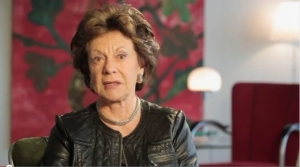These days, no political discussion can ignore the economy.
My message is simple: to think about the future economy, remember the digital revolution. Because it's changing our world.
The facts are stark. The European Internet economy is already bigger than Belgium’s economy; and growing faster than the Chinese. Already worth hundreds of billions of euros, in a few years, it could reach over 5% of EU GDP. And by 2016, online spending could account for over one retail euro in ten.
Studies show that ICT investment is among the most productive there is. It enables new ways of doing business, new ways to power productivity, new ways to innovate.
And it gives me new hope that we can fuel growth for a job-rich recovery. We must put in the effort now. Otherwise we won't be able to reap the benefits. And we will be doing a serious disservice to tomorrow's economy, and future generations. There are three things we need in particular.
First, we need the legal framework that opens up a vibrant digital Single Market. So people don't face at every turn barriers, restrictions, high costs.
Costs like outrageous roaming charges.
We can put an end to these rip-offs once and for all. Thank you all – especially Angelika Niebler - for your support in delivering our preliminary agreement. This package will boost competition, lower prices, and connect our digital Single Market. And, if we're building a vibrant digital Single Market, don't forget we need the resources to fuel it: rich online content. We've all seen how much the people of Europe care about online content and the rules that govern it. They've come onto the streets to make their voices heard. And they expect us to adapt to a new, open era. We must show we can do that. And indeed my colleague Michel Barnier is working on proposals on the copyright regime.
Our proposal on orphan works aimed to start delivering some of this openness, some of this change. I regret that current amendments would drastically cut back the most progressive elements of the Commission proposal: in particular regarding the commercial use option. If this continues it could be a big missed opportunity. The text must be quite clear that public service cultural bodies have the right to generate revenues consistent with their public service missions; including via public-private partnerships.
And here's another way we could really show our commitment to change. Let's start with public administrations themselves. The market based on open data is already worth tens of billions of euros. Our legal proposals on public sector information would unlock this goldmine – stimulating new economic and social applications, improving democratic scrutiny, and supporting evidence-based policy making itself. I hope I can count on your support.
We will also produce before the summer a legal proposal on electronic identification, authentication and signatures.
This framework will ensure, first, EU-wide mutual recognition and acceptance of e-ID and e-authentication. Second, making electronic signatures more interoperable and more usable, including through mobiles. And third, it will also cover related services like time stamping, certified delivery and so on.






